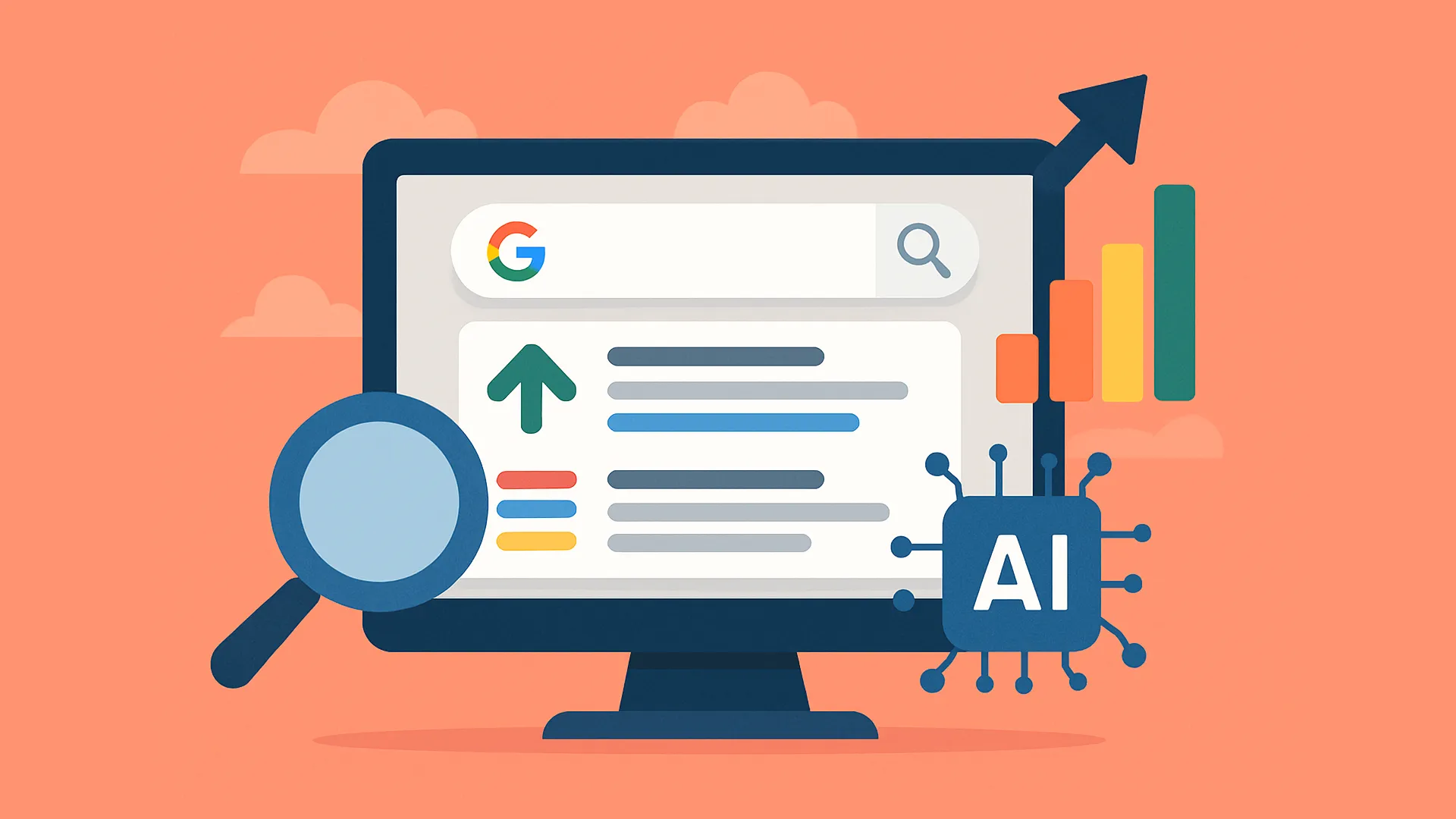Google’s new AI-powered Search features (like AI Overviews and Generative AI results) give users answers at the top of the page by summarizing information from multiple sources. This shift in Google’s search results means small businesses face a transformed landscape. Gone are the days when ranking #1 for a keyword guaranteed clicks; now your goal is to be featured or cited by Google’s AI. As Google itself notes, these AI overviews have already been used billions of times and make people “use Search more, and are more satisfied with their results”. For SMBs, the key is adapting traditional SEO to this new “AI-overview” world.
What Are Google’s AI Overviews and New Search Modes?
Google’s AI Overviews (part of the “Search Generative Experience” or SGE) are AI-generated summary boxes that appear above the normal search results. Instead of showing just one featured snippet, an AI Overview pulls together key points from several websites to answer the query. For example, a search for “best local SEO strategies” might now produce a concise AI summary at the top of the page, with links to several cited sources. This is different from the old featured snippet (which quoted a single site); AI Overviews cite multiple sources in one place. Being included here is like earning a new kind of “position zero,” giving your brand prime visibility (and credibility) in search results.
Google is rolling out AI Mode as well, which handles queries by breaking them into sub-questions and running multiple searches in parallel. This means search results may become AI-organized: results will be grouped under AI-generated headings or even presented as “chat-style” follow-ups. For SMBs, the upshot is that ranking high on a keyword isn’t enough – your content must be structured and authoritative so Google’s AI will cite it. In fact, SEO experts note that “the competition for visibility is no longer just about ranking #1 for a keyword. It’s about being referenced, cited, and structured well enough to be pulled into those AI-generated overviews”.
In practice, an AI Overview looks like this example screenshot: a summary at the top (labeled “AI Overview”) with key points pulled from multiple sources. (This image is an illustrative mock-up of Google’s SGE interface.) According to Google, these AI snapshots often include several links to visit for more detail. Google emphasizes that its AI-led search still sends traffic to websites, and ads will remain clearly labeled on the page. In fact, Google says AI Overviews can drive clicks: “we see that the links included in AI Overviews get more clicks than if the page had appeared as a traditional web listing”.
How AI Search Is Impacting SMB Visibility
The rise of AI Overviews is reshaping how often people click through to websites. Studies show that when AI Overviews appear, organic click-through rates drop sharply – early data reports 15–70% fewer clicks on average. One SEO analysis even found that Google’s AI answers correlate with a ~34.5% lower click-through rate for the top organic result on informational queries. In simple terms, many users now get the answers they need right on Google’s page and skip individual websites. This “zero-click” search trend means traditional organic traffic can sink dramatically. For example, one small publisher saw impressions rise but clicks fall by 90% after AI Overviews rolled out.
That said, being featured in an AI Overview can still increase brand visibility. When your content is summarized at the top of the page, your brand name and website are seen by more people (even if they don’t click immediately). As marketing expert Neil Patel notes, SEO today isn’t just about clicks: “if you don’t show up, you are missing out on the opportunity to promote your brand and gain impressions”. In other words, an AI Overview can act like a giant ad – users see you as a trusted answer. One SMB study even found that AI Overviews sometimes boost clicks for branded queries by up to 18%, because the user is already interested in that brand.
Types of queries differ in impact: AI Overviews are most common on informational queries (broad “how-to” or “what is” questions). Content that used to rank well for FAQs and blog posts is now often fully answered by the AI, reducing clicks. By contrast, branded and transactional queries (like product or local service searches) are less affected so far. People searching for your exact business name or looking to buy usually still click through at similar rates. This suggests small businesses with strong brands or clear ecommerce listings have a bit more resilience. Nevertheless, data shows that if your page isn’t included in the AI answer, you can lose about half of your usual clicks.
The overall impact on business can be mixed. Google claims users are more satisfied and engaging more with Search after adding AI Overviews, which could mean higher intent and conversions from those who do click. But many SMBs have seen their organic leads drop significantly. To adapt, businesses must shift strategy: instead of only fighting for the #1 spot, the goal is to be cited in the AI answer. Google acknowledges this new dynamic, committing that it will still “highlight and drive attention to content on the web, making it easy for people to dive deeper,” and that it is “committed to continue sending valuable traffic to sites across the web”. However, the reality is that SEO must now focus on trust and structure as much as on keywords.
If this change has you worried about lost visibility or sales, we can help. Contact us to assess how Google’s AI features may be affecting your site and how to regain visibility.
Why AI Search Matters for Sales and Growth
AI-powered answers are not just a tech novelty – they change the customer journey. Users trust Google’s AI answers to be quick, accurate, and consolidated. In effect, the AI overview becomes the new “face” of your business on Google. If your site is cited as a source, potential customers see you as an authority. But if not, the AI may simply gloss over your brand. As one SEO consultant warns, AI answers are “the new trust standard” – if your business is not mentioned, it may be left out of the user’s decision-making process.
Furthermore, Google’s generative search features are a stepping stone toward a future where AI agents make purchases for users. Imagine a voice assistant booking a service for a user: it will use the AI’s knowledge graph to pick businesses it trusts. In that world, your website is “infrastructure” for the AI to parse rather than a direct sales pitch. The more complete and up-to-date your online information (reviews, pricing, descriptions), the more likely AI systems will pick you. Google’s product search AI, for instance, pulls live pricing, reviews, and images from its Shopping Graph to create rich answers. This means that keeping product data accurate in Google’s databases is crucial.
In summary, AI search is changing both discoverability and credibility: you may get fewer direct clicks, but any click you do get is from a more informed customer, and simply being visible in answers builds trust and brand awareness. As an SMB owner, focus on being the first brand considered when Google’s AI is answering questions about your niche. Remember the old saying: rankings are clicks; presence is impressions. AI search shifts the battle from “who ranks #1” to “who is recognized as authoritative across search.”
Still have questions on how this affects your business? Contact us and our SEO experts will explain how to navigate AI-powered Search and keep your leads coming.
Strategies to Adapt and Rank in AI Search
Small businesses should respond proactively. In practice, many traditional SEO best practices still apply – but with an AI twist. Here are key tactics to stay visible and drive conversions in Google’s AI-driven Search:
- Focus on clear, high-quality content. Answer common questions directly and concisely, with an authoritative tone. Use headings, bullet points, and short paragraphs so Google’s AI can easily parse your answers. For example, a “how-to” guide should list steps or key facts in the top lines. The first sentence or two of your content should answer the user’s question straight away. This not only helps your SEO but can make your content more likely to be excerpted in an AI Overview.
- Use structured data (schema). Adding schema markup tells Google exactly what each part of your content is (FAQ, product info, local address, etc.). Google’s AI looks for this kind of structured information when choosing content. For instance, if you have a FAQ page, use FAQPage schema; for product pages, use Product schema with price, reviews and availability. Local businesses should ensure their Google Business Profile is complete (hours, category, etc.) and use LocalBusiness schema on their site. These signals make it much easier for AI to trust and cite your content.
- Build authority and brand presence. Google’s AI is more likely to cite brands it “knows.” Write in-depth, expert content on your key topics so you become the go-to source. Encourage reviews and social mentions in your niche – positive reviews and recent content help the AI see your business in a positive light. Invest in your branding (logos, consistent naming, local reputation); strong brand searches are “more resilient” to AI changes. In other words, even if a user doesn’t click right away, seeing your brand name in AI answers over time builds trust.
- Optimize for local and niche queries. Many AI answers still pull heavily from Google Maps, directories and reviews for local search. Ensure all your listings (Google Maps, Yelp, industry directories) are accurate and up-to-date. Encourage happy customers to leave reviews, as AI often quotes review lines in answers. Also, create content for specific local or niche questions (e.g. “does [business name] offer curbside pickup?” or “how to get to [store]”). AI Overviews frequently trigger on low-competition, informational queries like this. By answering these queries clearly on your site, you can become the cited source in the AI answer.
- Diversify your marketing channels. Don’t put all your eggs in organic SEO. Build an email list, engage on social media, and consider paid ads. (Notably, Google Ads still appear prominently even with AI Overviews.) For example, paid campaigns can show above and below AI answers, capturing leads that organic might miss. Social platforms can also drive people to your site without relying on search. If organic search clicks fall, other channels will help keep leads flowing.
- Monitor and iterate. Keep an eye on your analytics and Google Search Console: watch which queries now trigger AI Overviews, and see how your pages perform. In Search Console, you may notice pages with stable impressions but falling clicks. Use that insight to adjust content. Also, try experimenting with content format – for instance, adding a video or an infographic can sometimes attract AI citations. Track keyword visibility using SEO tools (like SEMrush or Ahrefs filters for AI features) and refine over time.
By combining these strategies, your business can adapt to AI-powered Search rather than fight it. The core principle is simple: be useful and authoritative in the format AI wants. If your content genuinely answers questions better than anyone else’s, Google’s AI will have a reason to cite you.
Still feeling overwhelmed? Our team is ready to help your SMB thrive in Google’s new AI-driven Search era. Contact us today to develop an AI-friendly SEO plan tailored to your business.
Conclusion
Google’s shift to generative AI in search is a major change, but it’s not the end of the road for small businesses online. It does mean that SEO isn’t just about keywords anymore – it’s about trust, structure, and quality. AI Overviews and modes will reward sites that clearly answer real user questions and have solid online reputations. By focusing on helpful content, proper schema, local presence, and a strong brand, SMBs can maintain visibility and even use these new features to their advantage.
In the end, what Google’s AI really wants is to connect users with authoritative answers – often by directing them to trusted websites. If your business becomes that trusted source, you’ll capture both the attention and the conversions of customers in this AI-powered world. For personalized guidance on optimizing your site for Google’s AI Search, don’t hesitate to reach out. Reach out to us and let’s ensure your business stays visible, credible, and competitive under Google’s AI-driven search.
Latest Blogs
Fresh Insights, Expert Tips, and Trendspotting to Keep Your Business Ahead
We want to work with you.
We’re always looking for partners to help us deliver top-notch services. If you’re excited to collaborate and bring digital growth solutions to clients together, let’s connect and make it happen.
Ready to Elevate Your Digital Presence?
Discover how Tezons’ bespoke strategies and cutting-edge solutions can drive real growth. Connect with our team today and let’s turn your vision into results!

Join Tezons.
Eager to elevate your career? Join our team of innovators and contact us today to discover exciting opportunities at Tezons.





